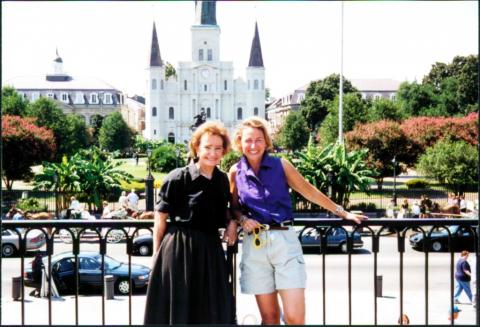When I am struggling in the in-between spaces of my work, between client projects, speaking engagements and in the necessarily self-propelled spaces of my fragmented life as a writer, speaker, educator and consultant, I seem to return to the same question as many: “Do I make a difference?”
In this most recent round of reflection, the memory of my mother’s oncology nurse, Phyllis floated up. Phyllis had worked on the unit for nine years during which time she had shepherded countless families through their journey with cancer—some to happy endings, many through the painful final days. Phyllis also had a deeply personal relationship to cancer, having lost her own husband to the disease only a year before.
In the months my mom was in and out of the oncology unit at Baptist East Hospital in Louisville, Kentucky, Phyllis became a touchstone. She seemed to be the one on duty when we received both promising news, and major setbacks. Through it all, she was present, compassionate, and encouraging. She treated me and my brother, and our partners, with kindness and as people with whole lives, which until only recently had nothing to do with cancer, hospitals, surgeons and doctors.

For four months I remained fiercely hopeful for my mother’s recovery. In the fifth month, in a tearful consult with her oncologist and surgeon it was clear that there was no more to be done, nothing more to do but be present and lovingly care-full to my mom during her final days. I spent most of those days quietly sitting by her bedside, listening to the click click click of the machines, watching the drip drip drip of the IV and starring at my mothers face, hands and feet studying every freckle and vein—trying to memorize her so I would never forget even a strand of hair in her all-too-soon absence.
On one of these days, as I sat starring, studying and listening in the dim room Phyllis walked into the room to change my mother’s IV bag. I looked up and was struck by her consistent grace. For a moment, I set my grief aside and asked her how she did it. How did she, with all she had seen, day in and day out, the pain, the loss, the loss of her own husband, and the too few and far between miracles—how did she do it? How did she show up, day after day and still maintain her presence and good cheer?
Phyllis responded to me with a simple wisdom, that I call up to this day–in times of frustration, and in the completely non-life-threatening in-between spaces of my life. She stopped, in mid-hanging of the IV bag and said, “You know, honey, I think all of us here would tell you the same thing. And we don’t even have to talk about it—we all know that we can’t control this disease, or necessarily impact the final outcome, but each and every one of us on the floor knows that we make a difference.” And with that, she finished hanging the IV bag and slipped out.
A few days later, an hour before Mother’s Day, my mom slipped away. With me, my partner, my brother and his wife all by her side. And while this was not the outcome any of us hoped, prayed, and pleaded for—while her death sent us tumbling into our grief—to this day, each and every one of us knows that we, too, made a difference. We made a difference to my mom and each other by our presence, love and care. We couldn’t save her from the disease, and we still made a difference.
This is the lesson I learn and re-learn in the spaces in-between, when I can be prone to morbid self-reflection: that there are very few things we have ultimate control over: whether clients follow through on our guidance, or their commitments, whether people buy (and, then actually read) our books, whether the new leadership builds on the progress of their predecessors, or a thousand other uncontrollable twists and turns of the human and natural systems in which we work. AND, each of us, if we show up with presence, integrity, and care, living and working at the top of our capacity, can rest assured that, just as Phyllis does, each day we, too, make a difference.
